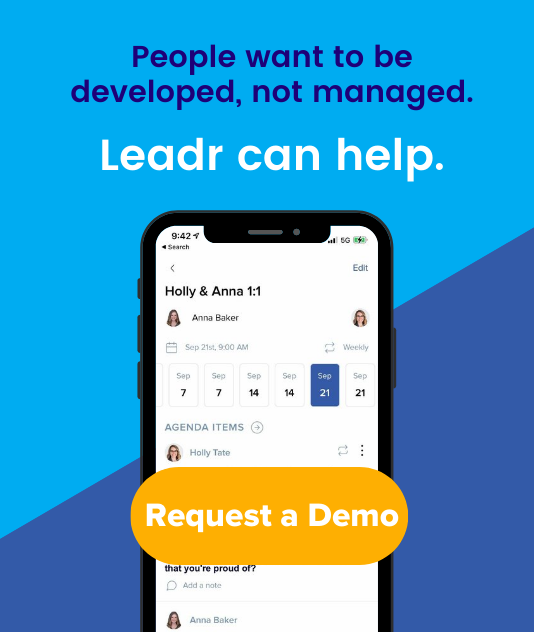3 Ways To Become a Better Leader By Developing Your Personal Strengths
What makes a team great? Some say the right set of skills, a commitment to team values above all else, or tenacity. While these things are certainly important for excellent collaborative output, teamwork truly begins at the individual level. Teams can begin to thrive as a unit when there’s a happy marriage of individual strengths shining through each of your team members who know what they bring to the table, with a willingness to jump in, serve, and learn.
At Leadr, we say, to be a team player, you have to know what you bring to the table. Knowing your personal strengths will lead you to deeper self-awareness as you develop into a leader.
As your team members each lean into their strengths, they find ways to lead and serve others, utilize their gifts to benefit the organization, and are constantly finding ways to better themselves as they follow their passions and strengths.
But where do you start understanding exactly what unique skills you bring to your particular team? Here are three steps to zeroing in on your personal strengths to unlock unique leadership traits that will elevate how you contribute to your team and make a true impact.
Determine your personal strengths.
One obvious starting place is to think about what you’re doing when you’re happiest. Research from Gallup found that people who use their strengths every day are three times more likely to report having an excellent quality of life. They're six times more likely to be engaged at work. And this group reports feeling 8% more productive, and 15% less likely to quit their jobs.
Simply put, those who use their personal strengths at work also outperform those who don’t.
That’s powerful proof: figuring out what your personal strengths are is a great way not just to be happier at work and a better team player, but also to take the first step towards developing more effective leadership traits, stabilizing your path to long term success and satisfaction at your job, and so much more.
When does your supervisor or teammate notice that you’re happiest or feeling most fulfilled at work? What are you doing? What do your teammates say about you and what you bring to the team?
Feedback is a critical tool in determining the areas where your contribution is felt most on your team. Ask your boss or your team to point those things out to you as you continue on a journey towards leadership or into better leadership and develop leadership traits. You’ll find that asking for feedback opens the door for others to consider and share their input more often. Those tidbits of feedback are the key to growth.
Also encourage feedback in one on one meetings and allow those meetings to be a reflective conversation as you work towards these traits and goals. What are your unique strengths? Hone in on those. What are your personal weaknesses? Reflect on those as well and let them be a teacher and guide for you as you adapt and improve. Remember that every individual has improvement areas. The more you recognize and improve on those, the greater a leader you can become.
Make giving feedback about personal strengths a part of your culture too - the more you can build it in, the easier it is for others to follow your lead and encourage others in their personal strengths.
Good culture truly is contagious - others will want to join as they see their teammate’s gifts and personal strengths championed by leadership and given room to grow and lead where they are gifted.
Sam Walton, entrepreneurial leader and founder of Walmart, echoes this encouragement we believe is foundational to making personal strengths a part of your culture:
“Outstanding leaders go out of the way to boost the self-esteem of their personnel. If people believe in themselves, it’s amazing what they can accomplish.”
Your team will find that the sky's the limit when they have the resources, feedback and knowledge that you believe in them, and they can too.
---
At the same time, what you enjoy may not be what you’re best at. If that’s the case, remember that as a leader, your goal is to further the organization from your seat at the table. It may take some internal pep-talking, but it’s a privilege to do meaningful work that is ultimately for the greater good of your organization.
Maybe that means you don’t look forward to having tough conversations with employees because you struggle with confrontation, but you’re especially gifted in listening and pulling out pain points and making others feel heard and valued. Utilizing those skills could help your team members struggling at work to identify where they need to grow, and what they need to do to get there.
That’s a win for everyone.
Exercise your strengths
Discovering your personal strengths is a process, but as you gain clarity in what they are, make sure you find ways to use them! Personal strengths are like a muscle - the more you use them, the stronger they become.
Maybe for you, this looks like finding intentional time every day to demonstrate your strengths to your team or in your role. It could be as small as finding ways to build it into processes if your strengths are in organization, or you volunteer to take on an extra project or offer to help with another department doing something you genuinely enjoy.
This has a twofold benefit to it: not only do you feel energized and happier at work as you lean into your unique personal strengths, but you begin building a portfolio of experience to show your potential to leadership as you grow.
Because you’ve built a track record of tangible proof where you can contribute the most, you’ll be the one who comes to mind as a natural fit if an official position opens up there.
Strive to have an attitude of agility as you constantly reevaluate and ask for feedback.
Just like discovering your personal strengths is a process, so is the path towards fully integrating them into your role or reaching the end goal of a leadership pathway.
Leave space for yourself to change and grow - having an attitude of agility is a key skill that will be foundational to any personal strengths you focus on or pursue. As companies change, higher-up leadership joins or leaves, or even as teammate transitions happen, you might find that putting all your confidence in your position or title leaves you frustrated if changes happen.
Instead, keep a focus on what your identity as a team member or leader is - what are your personal strengths and how can you contribute those to the team, no matter what you’re doing, or what the work or organization looks like?
Are you willing to be a team player? Are you available? These questions can help clarify and motivate you as you dig deeper into your personal strengths and reflect on what being a great team player is like.
You could also find that as you grow, you find new strengths to develop, utilize, and share with others. That’s why we champion the Leadership Development Plan for every level of staff at Leadr, because through discussion, reading, and mentorship with other leaders, it builds space for new strengths to emerge, passions to be recognized and for anyone to step up and take initiative.
If you are looking to improve your leadership development program or consider implementing one at your organization, we’ve done the heavy lifting for you in our eBook, Your Guide To Building A Comprehensive Leadership Development Program. Download it now for tips, timelines, and templates for building a program that engages and grows every person on your team.
Continuously ask for feedback on this process too - research from Gallup in 2017’s State of the American Workplace found that only six in 10 employees know what those expectations are, and just 41% ‘strongly agree’ that their job description aligns well with the work they are asked to do. Make sure that as you ask for feedback, you are clear on what your job and team expectations are. On Top of reducing frustration and apathy towards your role, aligning on expectations can help you prioritize personal strengths that would maximize the benefits for your team and organization.
---
Owning your personal strengths is a key component of leadership. Many shy away from thinking about this out of fear of appearing egotistical. But the real fear should be that you might miss out on an opportunity that will elevate your organization, root you in a role where your leadership flourishes and your team is happy and valued, or a spot where you might find true joy at work doing something you love.
Be proud of what you bring to the table and confident enough to share it - it’s the only way to make progress!
Share with us: what’s one thing you can do this week to begin identifying or utilizing your personal strengths at work?
If you’re passionate about people development, we’d love to share of Leadr’s software can help your organization engage and grow people at every level of your organization. Request a demo with our team to see Leadr in action.
Share this
You May Also Like
These Related Stories

You Hired The Right People, But Are They In The Right Seat?

Nail the First Impression - Why Mission and Vision Matter in Your Onboarding Process




No Comments Yet
Let us know what you think